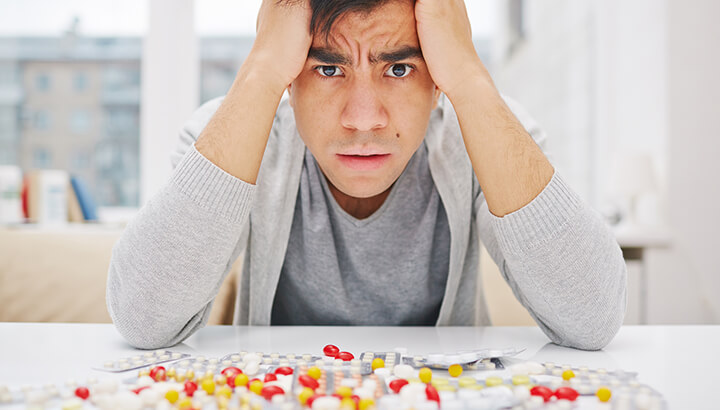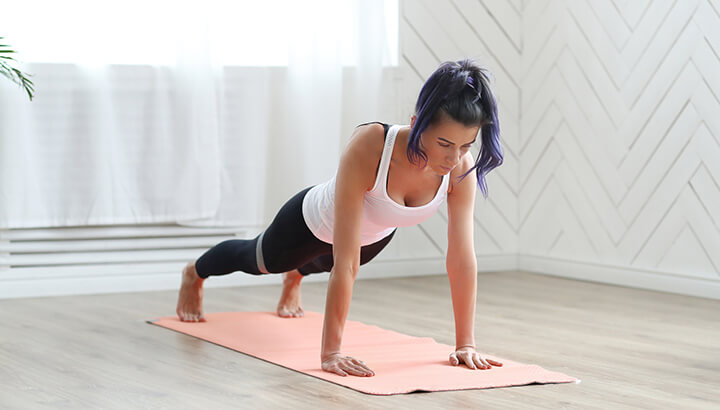
If you’re one of the 40 million Americans suffering from anxiety, you know how uncomfortable it can be. Even though it’s awful while it’s happening, anxiety serves an important function. Here are a few reasons to think of anxiety as a superpower and how to manage it naturally.
What is an anxiety attack?
An anxiety attack, or panic attack, is the sudden onset of intense fear coupled with a variety of physical symptoms, according to the Anxiety and Depression Association of America. You may experience a pounding heart, sweating, shaking, shortness of breath, chest pain, feeling dizzy, chills, tingling sensations, fear of losing control or even feel like you’re dying.
Because of the intensity of the experience, many people head to the emergency room convinced that they are having a heart attack or breathing issues. However, it’s important to know that an anxiety attack in and of itself is not life-threatening and usually subsides about 20 minutes after it peaks.
Change the way you think about anxiety treatment
First of all, without anxiety, you would not be here today. This is because when you sense that you’re in some kind of danger, the sympathetic nervous system gets activated, also known as the fight or flight response. It’s a basic survival mechanism from way back when our ancestors were hunting and gathering in the wilderness.
The problem is, times have changed, yet our nervous systems are still overreacting to things we perceive as threatening. Instead of being chased by a tiger, for example, we now experience anxiety when we open up our email inbox or get stuck in traffic. Though not life threatening, our bodies don’t know the difference. This paves the way for an endless cycle of anxiety, nervous system overload and adrenal fatigue, which can eventually lead to health issues.
Still, anxiety is not something that should be fixed — it’s a superpower that needs to be managed. By changing the way you think about anxiety, you’re already one step closer towards ending the suffering. If you’re a naturally anxious person, try to see the good in your situation. In small doses, scientists say it’s actually a good thing.
Here are a few reasons why anxiety is a little-known superpower:
1. You may be more creative than non-anxious folk

History is filled with anxious artists, politicians and geniuses, from Abraham Lincoln to Charles Darwin. Researchers have found a correlation between mental health disorders and creativity. In one study of a population in Iceland, for example, researchers found that those in artistic societies (visual artists, writers, dancers, musicians) were 17 percent more likely to carry variants linked to mental health conditions than the general population. So, if you are suffering from anxiety, channeling your nervous energy into an artistic endeavor is a great way to prevent or halt a panic attack.
2. It heightens your senses
When your fight or flight response is activated, your pupils dilate so you can see your perceived threat better. You may also experience tunnel vision. Your reaction time quickens, your reflexes improve and your brain function increases. Your body also shuts down all non-essential functions — like digestion — so you can focus on overcoming the task at hand.
3. You’re great at reading people
In one study, researchers found that anxious participants were able to pull out a threatening face faster than their laid-back counterparts, in under 200 milliseconds. And, people’s reactions were quicker if the threatening face was looking right in the participant’s direction.
4. It brings you closer to other people
Research shows that stress is more than just a survival mechanism — it may actually prove vital for our relationships. In her Ted Talk, Dr. Kelly McGonigal shows how stress is the catalyst for emotional support. “When oxytocin is released in the stress response, it is motivating you to seek support. Your biological stress response in nudging you to tell someone how you feel instead of bottling it up. When life is difficult, your stress response wants you to be surrounded by people who care about you,” she says.
5. Short-lived anxiety improves your memory
Ever noticed how when you’re stressed, your brain performs better? That’s because the stress hormones released during anxiety can increase alertness and cognition. One study on rats even found that acute stress had a beneficial effect on the hippocampus, the key region in the brain responsible for memory.
6. Your physical performance improves
If you’re an athlete, you’re probably familiar with pre-performance anxiety. Instead of trying to stop it, realize that your body is gearing up to take your performance to the next level. Under stress, you experience increased blood flow to the muscles, higher blood pressure, quicker heart rate and increased supply of sugars and fats to get a steady stream of energy. In other words, short-lived anxiety may turn you into a bit of a ninja.

Should you treat anxiety with medication?
Because of anxiety’s uncomfortable physiological effects — shaking, headaches, clammy hands, sweating, panic attacks, insomnia — it may be tempting to take an anti-anxiety medication to make the wave easier to ride out.
However, conventional medications for anxiety can come with a host of side effects that you need to be aware of. Doctors frequently prescribe anxious patients a class of anti-anxiety drugs called benzodiazepines (also called “benzos”), which include Valium, Ativan, Lorazepam, Klonopin and Xanax. These drugs work by enhancing the gabba-aminobutyric acid (GABA) neurotransmitter, producing pleasurable, relaxing effects within minutes. In essence, they’re highly powerful, highly addictive tranquilizers.
Not surprisingly, patients can experience any of the following side effects: confusion, dizziness, trembling, vision issues, weakness, impaired coordination, drowsiness and slurred speech, short term memory loss, difficulty breathing, loss of sex drive and feelings of depression.
Medication withdrawal and long-term effects

Prolonged use of anti-anxiety medications, in particular, can have several consequences where brain health is concerned. For example, benzo withdrawal can actually create anxiety and insomnia. Ironic, because many people start taking benzos for anxiety and insomnia in the first place. This rebound effect is typically more severe than the patient’s original anxiety and insomnia.
In addition, one study showed that patients who take benzodiazepines for more than six months have an 84 percent chance of developing Alzheimer’s disease. In another study, researchers found that benzos impair cognition over long-term use, including the brain’s speed of processing and verbal learning. Basically, that’s fancy talk for brain damage.
How to cultivate calm naturally

While anxiety is uncomfortable, it serves an important function — letting your mind and body know when something is out of sync. However, once you’ve gotten the message, sometimes your body needs to catch-up and reset itself. Here are some ways to soothe your body after a particularly bad bout of anxiety.
- Take deep breaths to massage all the major organ systems in your body.
- Get a massage to manually relax the nervous system.
- Go to a yoga class to naturally lower blood pressure and activate the parasympathetic nervous system (that thing that turns off the flight or fight response).
- Drink chamomile tea for its natural sedative properties.
- Inhale lavender essential oil in a diffuser to promote a sense of calm.
- Cut or reduce caffeine — you may be surprised by how much better you feel!
- Cuddle a pet (or partner) to get a quick release of oxytocin, the cuddle hormone
- Take up meditation to keep your mind focused on the present, instead of stressing about the problems of the past or the possibilities of the future.
- Turn off the news since studies show it can negatively alter your worldview.
- Stop scrolling through social media to protect your mental health, according to multiple studies.
- Practice an attitude of gratitude, starting with these tips first thing in the morning.
- Smile or laugh to release endorphins in the brain naturally.
- Get outside and walk around in nature barefoot to “ground” your mind and body.
If your anxiety is getting in the way of your daily life, talk to a counselor. This will help you get your thoughts off your chest and learn how to manage your stressors in new ways. Sometimes we have residual hurt left over from childhood or trauma that makes our bodies overreact in everyday situations.
How does anxiety help you? How do you help soothe your body after a tough time? Let us know in the comments!
— The Alternative Daily

